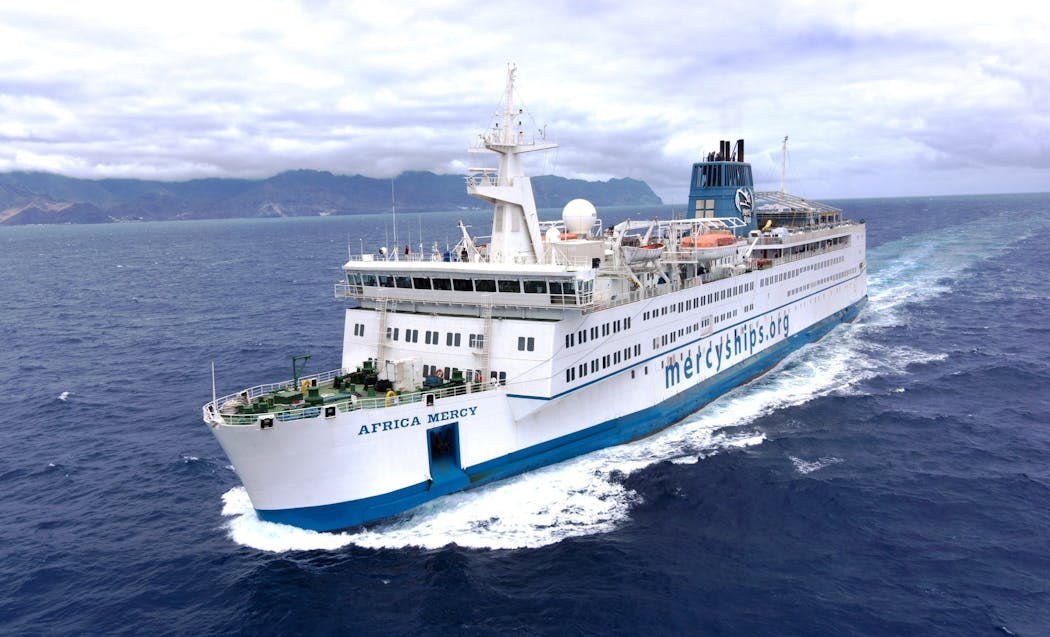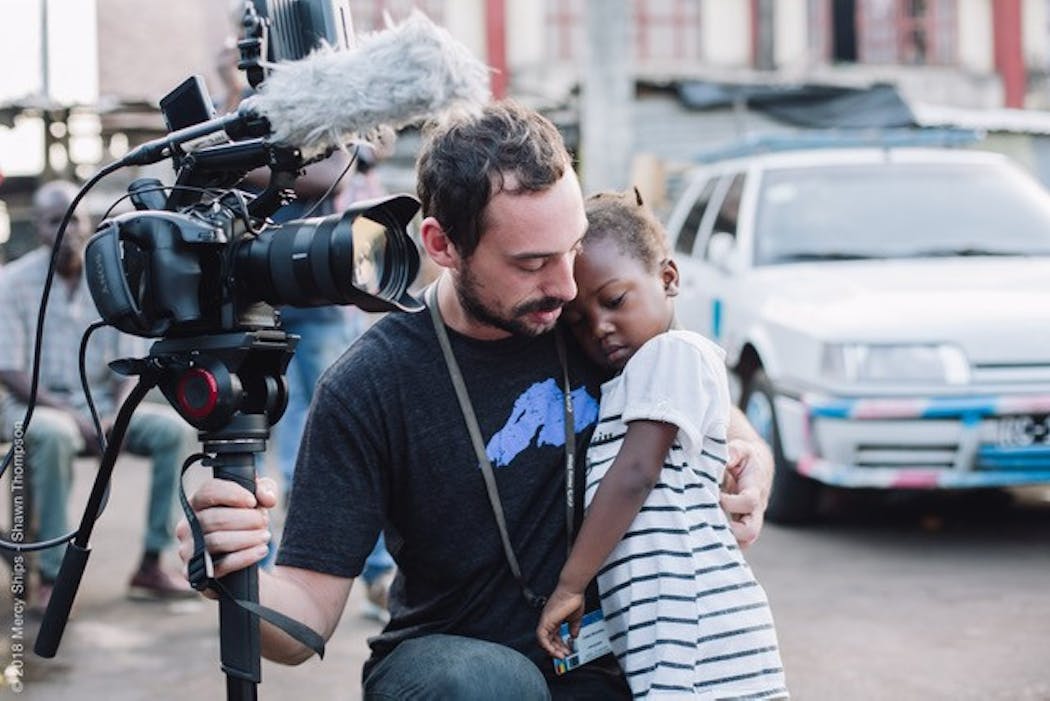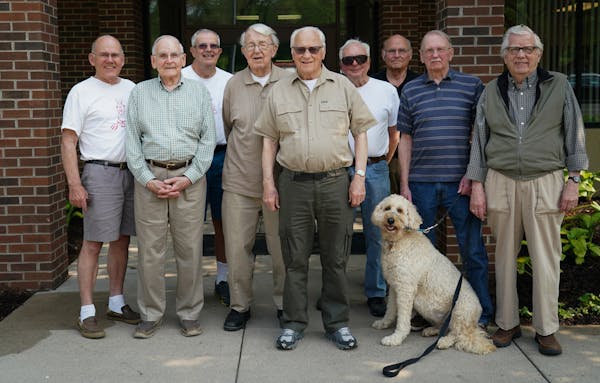One evening in August of 2017, Rose Talbot, 25, and Caleb Brumley, 30, were talking over a meal, their first together, in the dining room of the Africa Mercy, the world's largest private hospital ship.
Then docked in Cameroon, the ship provides free lifesaving surgeries to people in underdeveloped countries where medical care is nearly nonexistent.
Brumley, a St. Paul-based videographer, had just joined the ship's communications team. He had been looking for a change from the run-of-the-mill gigs he'd been doing after studying theater and film production at Azusa Pacific University in California.
A month earlier, Talbot, a dual citizen of the United Kingdom and Switzerland, had joined the ship's team as a reporter and copywriter. Like everyone else on board, she was donating her time. But the idea of leaving her previous life behind to volunteer onboard didn't feel like a sacrifice.
"Of course I should go do this," she told herself. "This work matters, so where else would I rather be?"
Little did Brumley and Talbot know that they were about to discover a life partner.
The two will be married July 11 in Cottage Grove.
For 40 years, faith-based Mercy Ships has provided safe, free surgical care in West and Central Africa. Its medical teams have performed more than 100,000 surgical operations, from reconstructive plastic surgeries to dental care to orthopedic surgeries, and mentored and trained more than 1,000 African medical professionals.
Hundreds of doctors, nurses and nonmedical support staff — including Brumley and Talbot — volunteer from across the world to make this happen.
Currently, the Africa Mercy, the only ship in service, is en route to Dakar, Senegal, where it will dock for the next 10 months.
Bona fide happy endings
From their early days on the ship, Brumley and Talbot spent ample time together working on patients' stories. They joined teams that embarked on sometimes 1,000 kilometer road trips to visit a patient's village to document stories before patients were brought to the ship.
"By the time these patients hear about Mercy Ships, they've often been living as an outsider, ostracized by their community because of their bowling ball-sized tumor or severely bowed legs," Brumley said.
Mercy Ships advertises its free surgeries via radio, with posters showing before and after photos, and through local health care agencies, said spokeswoman Pauline Rick.
She noted that, once patients find out about their services, "they do anything in their power to get to us for help."
Sometimes that means selling a rice field to get money for transport. Many walk, take buses or taxis, Rick said, particularly if they have friends or family in the port city with whom they can stay.
"We had a patient in Madagascar that was carried on the backs of family and friends for two days to reach a road where he could get transportation to the port," she said.
Occasionally, patients are helicoptered out with Christian-based Mission Aviation Fellowship.
In the two years they were with Mercy Ships, Brumley and Talbot spent time with patients pre- and post-surgery, documenting their progress in the days or weeks they remained in the hospital wards receiving post-surgical care and rehabilitation.
Brumley and Talbot also visited patients again in their homes post surgery. "It's so much fun to watch so many of them come out of their shells and embrace community again," said Brumley.
Not all those stories ended well.
"Sometimes, even when surgery was successful, we would visit a patient in their village afterward and see that they still had so many nonmedical struggles they were facing that we just couldn't begin to fix," Talbot said.
But many stories did have bona fide happy endings. Brumley recalled visiting Sekouba, an 11-year-old boy in Kankan, Guinea, who missed a year of school due to a mandibular (jawbone) tumor. With the tumor removed, he was planning to return to school in the fall.
When Brumley asked him what he wanted to do when he grew up, Sekouba smiled and said he wanted to become a doctor. "I've had a lot of moments like that over the past two years," he said.
Brumley produced a two-minute patient story on another little boy named Pierre, whose deformed legs were fixed so that he could walk and run.
As they visited with patients like Sekouba and Pierre, Brumley and Talbot began to discuss the possibility of a future together.
He was drawn to Talbot's quirky sense of humor, childlike sense of wonder, and passion for loving and serving people.
Talbot appreciated how Brumley connected with people in a transparent and down to earth way. "He makes others feel comfortable and seen very naturally," Talbot said.
"It wasn't really any one specific moment, but more a series of little things that made me realize he was a teammate I wanted to keep forever."
Brumley is grateful that he was able to tell these heartwarming stories "alongside my best friend and soon-to-be-wife, Rose. I am an exceedingly lucky person.
"We've spent a lot of time together over these past two years, and we're not sick of each other yet."
They are looking forward to working and living in the U.S. after their marriage. While they don't plan to return to the ship, they treasure memories made there.
Talbot said she would remember her time on the ship as "wild, wonderful, unpredictable, exhausting and life-altering in pretty much every sense. It shifted my perspective on foreign aid and illuminated the many ways I took medical care and health in general for granted," she said.
"It's also brought me into a community of volunteers from around the world, some of whom I'm confident will be a part of my life for a very long time."
Brumley wants to continue making films for companies or causes "that are working to make the world a better place."
Talbot plans to continue working in communications for humanitarian organizations, learn to speak French fluently and add more country stamps to her passport.
She's also toying with the idea of pursuing a master's degree; she has a bachelor's degree in journalism.
"And, of course, I can't wait to get to know Caleb's world and people back home," said Talbot, who met Brumley's family and friends last summer when they spent a few weeks in St. Paul.
"I will say I feel unprepared for Minnesota winters, however," Talbot said.
"After two years in Africa, I'm not sure I'm equipped to handle that level of cold."
Streetscapes

Critics' picks: The 12 best things to do and see in the Twin Cities this week

6 new foods worth trying at a Timberwolves game

The pandemic made writer Kate DiCamillo realize, 'I'm not going to get through this unless I have a fairy tale to write'




